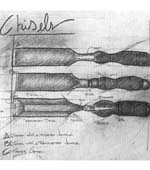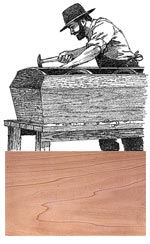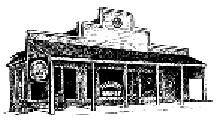SPLINTERS
Tennessee Valley Woodworkers
 Vol. 18/ Issue 11 November
2003 Editor: Tom Gillard Jr.
Vol. 18/ Issue 11 November
2003 Editor: Tom Gillard Jr. 

Meeting Notice:
The next meeting of the TN Valley Woodworkers
Will be held, November 18th, at 7:00 p.m. in the
Duck River Electric Building, Dechard, TN
All interested woodworkers are invited!

The following people have agreed to serve as contacts for their particular
skills. If you have questions, suggestions for activities, or other
comments relating to these skills, please call these folks. Their
interest is to help the club better serve their area of expertise.
Your participation with them will help them achieve that goal.
Design: Alice
Berry
454-3815
Finishing: Phil
Bishop
967-4626
Turning: Tom
Church
967-4460
Carving: Harry
May 962-0215
Sharpening:
Bob
Reese
728-7974
Joinery: Ross
Roepke 455-9140
Health and Safety:
Maurice
Ryan 962-1555
List of
Club Officers
President: Doyle
McConnell
V. President: Ken
Gould
Secretary: Barbara
Keen
Treasurer: Henry
Davis
Publicity: Loyd
Ackerman
Newsletter Editor Tom Gillard
Jr.
GOD BLESS AMERICA!

Please remember, in your thoughts and prayers, all our Troops heading
for the Middle East.
FOR MEMBERS ONLY
Don't forget about the club give-away this year.
We have a Tormek sharpening machine for some lucky winner at the Christmas
party.

ELECTION TIME IS HERE !
Last month the Nominating Committee announced the
Candidates for Club Officers for 2004.
President
Ken Gould
Vice President
Barbara Keen
Secretary
Chuck Taylor
Treasurer
Henry Davis
Publicity Chairman Larry
Bowers
News Letter Editor Tom Gillard
The election will be at this months meeting, campaign
signs and speeches will be permitted ! Let's turn out and VOTE
!
WELCOME NEW MEMBERS
In the last two months we have had five woodworkers
join us.
In September Wendell Melton and Robert Petry became members. Both
Wendell and Robert reside in Winchester.
Bub and Ann Chittenden from Cleveland Tn. joined us in October as did
Terry Tackney. Terry is from Madison Al. and is also a member of
the Edgewater Woodworkers Club in the Huntsville area.
WELCOME TO THE TENNESSEE VALLEY WOODWORKERS !
In Remembrance:
Manuel Brown passed away last month. The club donated a book
to the Tullahoma Library in his name.
Attention New Members:
Please bring in some of your work to show us during the Show and Tell portion
of the meeting. We are VERY interested in what our members are working
on and want to see some examples. We were all new members at one
time or another.
Thanks.
SHOW AND TELL:
Ken Gould brought in an 18th
century trammel 4 wick lamp he made using his black smiting knowledge and
then he decided to make another wooden mechanism. He made a reverse
trammel and it could be used for the mechanism of a music stand or an adjustable
feeder. Took him much less time to make the wooden one.
Maurice and Ruth Ryan while on a trip to Wisconsin saw some neat wooden
butterflies made from various scrap pieces of wood and another wooden item
that struck their interests. They brought in pictures of both pieces
for us to see.
John Mayberry brought in 2 boxes with
Curly Maple matched tops. The box is made of Cherry with Black
Walnut trim around the tops. They both have sliding lift out divided
shelves in them. He finished them with lacquer.
Jeff Roehm brought in a copy
of an 1869 classical quitar that he is making. It has Red Cedar,
Black Walnut, Brazilian Rosewood, and Satin Wood in it. He is doing
a French polish finish on it. He uses hide glue to put the bridge
on with and said he has seen guitars 85 years old and the glue still is
holding well.
Karen Kerce brought in a bowl that
she started in May and stopped and put it in the shavings from the turning
operation for storage. She got back at it and finished it.
It is Cherry with a turned base on it. She also built a barn this
summer and brought a picture in of it. She used OSB board that she
got for $5.00 a sheet and than textured it to look like stucco.
Doug Dunlap brought in a project
he had done long ago when he was in school for a shop project. It
was a cannon which he turned the brass for the barrel and made the carriage
out of Cherry.
Don Powers brought in a couple
of stylized power carvings. One is made out of Chittam Burl, which
is sometimes called yellow wood or smoke tree. The bird on it is carved
out of Cherry. It only grows from here to edge of Alabama and is getting
scarce. The other is made from Chattam and cedar driftwood
and mounted on an Oak block.
Hugh Hurst awhile back brought
in a bedpost that he was practicing turning and he had 4 to make for a
bed. He brought in tonight one of the four. This one he did
not have a long enough piece of wood to make it in one piece. He
had to make it in pieces and found out that you had to do this a certain
way or it would not be straight. He enlisted Tom’s help for the technique
of how to do this. It ended up being 3 pieces. You have to
turn tenons on the pieces that are going to go together.
Doyle McConnell brought in a
saw blade with tar and pitch on it and he showed how you could clean it
by putting Ammonia in a pizza pan and then putting the blade in it.
He said the pitch just floats off with out scrubbing or anything. He said
that he had worked on some very early Tennessee pieces and that he had
a sugar chest that had to be taken apart since it had a wide board in the
bottom and it had shrank over the years leaving a sizable crack.
He had to jack it apart and the tenon pulled a part before the glue would
come loose and this piece was a 150 years old.
Phil Bishop brought in pictures of his latest restoration project.
One of them was a Horner Atlas dining room suite. He needed to make
7 leafs for it. He also had to do some carving on several pieces.
This suite could bring more than $88,000 at auction. He also raised
a bed 16 inches.
Steve Shores brought in some
pieces that he used for his demonstration.
Ohio Buckeye

The wood of the Ohio buckeye was called “dead man’s wood” because of
its use for coffins.
The state of Ohio claims the Ohio buckeye as its official tree. And
Ohio State sports teams enthusiastically call themselves “Buckeyes.” But
few Buckeye fans acknowledge that their tree happens to be the only one
of the seven native species of the buckeye tree in the United States with
an offensive, even deadly, reputation.
Buckeye refers to the resemblance of the tree’s fruit—a nut—to the eye
of a deer. But unlike the fruit of the yellow (sweet) buckeye, which is
eaten by wild animals and livestock, Ohio buckeye nuts contain a poison
that numbs all that venture to eat it.
Late spring brings forth greenish yellow flowers amidst the leaves of
the shapely buckeye tree. Yet while the beholder admires the blooms, he
may hold his nose because of their foul odor. In fact, this trait has led
many who live where it grows to call the tree “stinking” buckeye.
When its blooms and their odor have long gone, the Ohio buckeye in its
greenery makes an attractive addition to the country landscape. But because
even the tree’s twigs and bark give off an offensive odor when bruised
and, along with the leaves, tend to be toxic, rural landowners have at
times waged war to eliminate it from their property.
Despite Ohio buckeye’s drawbacks, its wood was favored by pioneers.
It’s light, works easily, and doesn’t readily split. One use was for coffins,
earning it the name “dead man’s wood.” On a livelier note, buckeye was
also popular for dough bowls because it lacks odor or taste. And even the
nut—carried in a pocket—was believed to ward off rheumatism.
Illustration: Jim Stevenson
'WOOD'
On-line
STUFF for FREE
Guide
to Woodworking Glues
DID YOU KNOW
Our very first Christmas Gathering was at the home
of long time members Susan and Tom Church. That was in December of 1986.
At that time the club was participating the "Toys for Tots" project.
There were over 125 toys made by Club members and brought to Susan
and Tom's home. If the Kids that got the toys had as much fun playing with
them as some of our members they really enjoyed them.
Speaking of Christmas Gatherings, let's not forget that this year's
get together is scheduled for Friday December
12th.
- Christmas Potluck - At the First Church of the Nazarene Fellowship
Hall, address: (4th & Cumberland). I'm sure we'll
discuss the Christmas pot-luck at our next meeting. We've been asked to
bring a little something that you have made
to use for door prizes - . We'll also need to know how many to plan for,
so take a count of family and guests that are planning to attend. We'll
try to get a total at the November meeting.
Click HERE for a map


10 % OFF Fine Woodworking
Books from Taunton Press
…We’re open Monday thru Saturday
click on picture to visit Oldham

SEE YOU ON THE
18th!
 Vol. 18/ Issue 11 November
2003 Editor: Tom Gillard Jr.
Vol. 18/ Issue 11 November
2003 Editor: Tom Gillard Jr. 




